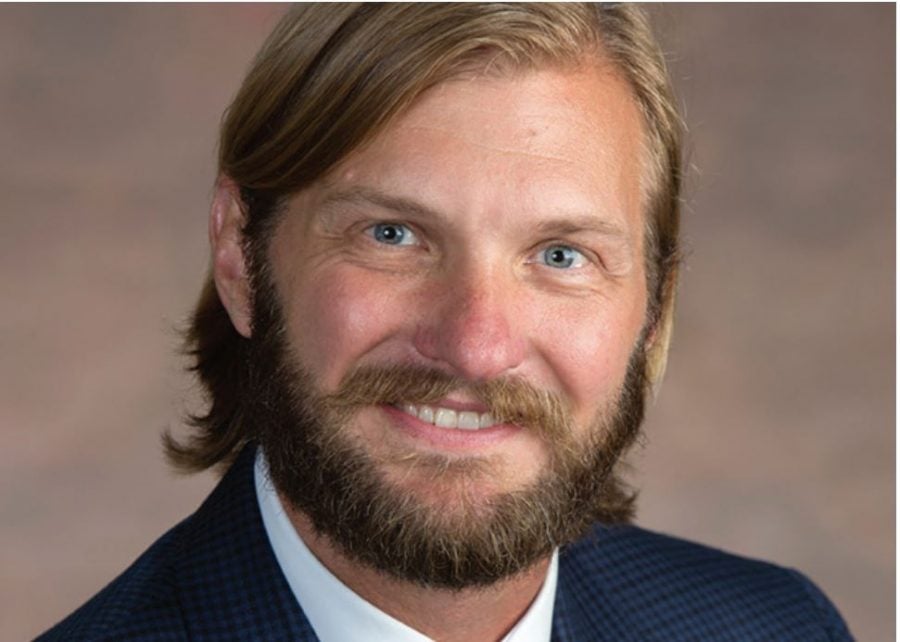Professor gives lecture on immigration
Philip Slaby, associate professor of history and chair of the history department, challenged the student body to make connections between past tensions surrounding immigration in France to current events in the United States.
Immigrants faced discrimination in the past and still do today.
“One of the things I would underscore about immigrants in general, and within democratic societies, is they are very, very vulnerable,” said Phil Slaby, associate professor of history and chair of the history department. “They do not possess citizenship and therefore, without citizenship their rights are always very weak.”
Slaby presented at the Annual Algie I. Newlin lecture on Feb. 14, 2017. The lectures occur annually in honor of the late Algie I. Newlin ‘21, who was a prominent student and teacher at Guilford and seek to highlight various topics in history. The Community Center at Guilford was full with people hoping to gain insight through Slaby’s lecture, especially due to the recent tensions surrounding immigration. Slaby spoke about immigration into France in a lecture titled “Immigration, Xenophobia and Democracy in 1930s France.”
“The larger point I was getting at was to explain why in the 1930s the French Republic turned from being very welcoming toward immigrants and offering them principle treatment to being discriminatory,” said Slaby.
The central argument of Slaby’s lecture was that France was too democratic.
“The public turned against immigrants, and then, elected officials were quite willing to follow them,” said Slaby. “France was too democratic— it followed the electorates’ wishes a little too closely and didn’t put up a brake of principle to stop that.”
But Slaby’s argument did not stop there.
“On one hand, it was too democratic, while on the other, it wasn’t democratic enough,” said Slaby.
He credits the latter part of his argument to French citizenry lacking democratic principles, French leaders failing to uphold the rule of law and the immigration system itself allowing for discretionary law to be used by government officials.
“The combination of being too democratic and not democratic enough flowed together to propel the anti-immigrant sentiment in the 30s,” said Slaby.
This resentment of immigrants in France stemmed from the belief that immigrants were taking economic opportunity away from French citizens.
“I think one thing that history shows is that it never really achieves anything positive to be exclusionary,” said Sarah Theusen, assistant professor of history. “As Phil pointed out, the exclusion or the deportation of immigrants from France didn’t alleviate the economic woes that France was undergoing.”
The lecture allowed Guilford students to reflect on attitudes about immigration in the past that they may not have known about.
“I just went to learn because I thought it was an interesting topic,” said first-year Alejandro Gonzalez Cruz. “It was interesting learning about how even amongst the Allies there were thoughts of the separation of groups.”
Many attended the event due to the relevance of immigration in modern day.
“I thought Phil’s lecture was wonderful,” said David Limburg, professor of German and chair of the foreign languages department. “It was a great topic that he chose because it had to do with immigration and xenophobia. He connected it nicely to what we’re going through in the world today.”
Slaby’s lecture not only extended to present issues surrounding immigration, but also prompted Guilford’s community to recognize implications that could be drawn from the events of 1930s France.
“I thought it was well done and I think any parallels we can draw between the past and the present are important steps,” said Maria Bobroff, associate professor of French. “Hopefully, someday, we as a society will learn from them.”
The discussion of past immigration problems and contemplation of immigration’s future raise the present question of how people should act now.
“Citizens have all sorts of rights and they can use them in a concerted way or they can use them in really irresponsible ways,” said Slaby. “In the end, be democratic.”










Walter Hassell • Feb 24, 2017 at 1:15 am
“The combination of being too democratic and not democratic enough flowed together to propel the anti-immigrant sentiment in the 30s”
Impeccable explanatory skills.
Seriously though, is this a direct quote? Was the entire premise of the argument self-contradictory and meaningless? Did the speaker lack the vocabulary to properly elucidate his point? I mean, every “quote” of his reads like a quote from Trump (in terms of the utter simplicity and repetitiveness, not the sentiment towards immigration…).